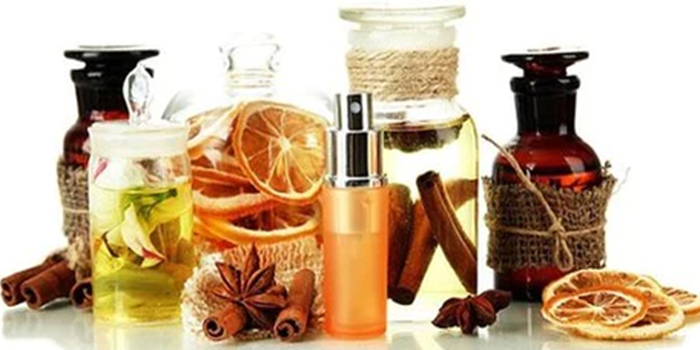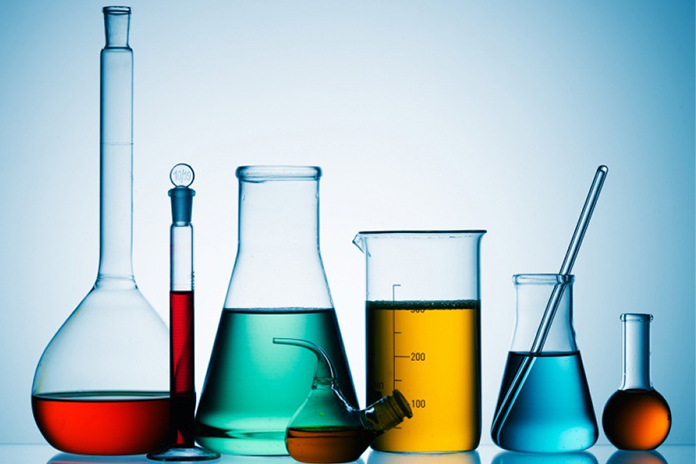An aroma chemical is a chemical compound used in various products to enhance flavors and fragrances. Growing manufacturing activities in perfume, cosmetics, soap, detergent, household cleaners, beauty, and hair care products have attributed to the growth of the need for aroma chemicals.
Natural fragrance chemicals are derived from plant extracts, whereas synthetic aroma chemicals are created in a laboratory to mimic natural odors. The wide range of scents that may be created by perfumers by using synthetic aroma compounds allows for substantial customization of the finished product.
Benzenoid is the type of aroma chemical that is often used to create floral, fruity, and woody notes in fragrances. Some common benzenoids include benzyl alcohol, cinnamaldehyde, and vanillin. Another chemical Terpenes are responsible for the characteristic scents of fruits, flowers, and herbs. Some common terpenes include limonene, linalool, and geraniol. Musk chemicals are often used in perfumes to create a base note that helps to unify the other fragrance notes
New Investments
Piramal Alternatives contributes Rs 225 crore to Harmony Organics in 2023. To capitalize on expanding prospects on a worldwide scale in the fragrance and flavor market. Harmony Organics produces specialty chemicals company has received a Rs 225 crore investment from Piramal Group’s fund management division.
Symrise has been bought a minority share in the Danish aroma firm by EvodiaBio. The investment results from a recent capital increase by EvodiaBio, which sought strategic investors to support its quickly expanding business. Precision fermentation is a novel technique created by EvodiaBio to create flavor products with a long shelf life for both food and beverages.
Applications- These aroma chemicals find large applications in Food & Beverages, Fine Chemicals, Cosmetics & Toiletries products, Soaps & Detergents, and Others.
Drivers- A growing need for natural fragrances from developing countries and major technology developments to match shifting consumer preferences are the main drivers of the fragrance industry’s growth.
Challenges- The development of the global market for fragrance chemicals may be hampered by the high research and development expenses and strict government regulations imposed on the production of aroma chemicals. Strict safety regulations and environmental effects may have an impact on the market for fragrance compounds.
Regulations regarding the use of aroma compounds in cosmetics are also present in the European Union (EU). Certain fragrance compounds are not allowed to be used in cosmetics under the EU’s Cosmetic Regulation (EU 1223/2009), and all other aroma chemicals must be safe for consumers. The names of all fragrance compounds must also be stated on cosmetics labels, according to EU regulations.
For the usage of aroma chemicals, there are both government laws and industry norms. There are restrictions on the use of specific fragrance compounds in cosmetics under the code of conduct of the International Fragrance Association (IFRA). Although the IFRA code of conduct is well-regarded in the cosmetics sector, it is not legally enforceable.

Regional Coverage
Asia Pacific region has substantial growth in the forecasting period. The use of natural fragrances and flavors is anticipated to increase consumer demand for perfumes in China, Japan, and India. In terms of growth, China has the second-biggest economy in the world. One of the factors was the desire for aroma extract in soaps and detergents. Additionally, it was projected that in 2022, wholesale and retail companies in China will sell more cosmetics than USD 58.2 billion.
The U.S. has a high share in aroma chemicals, which is expected to grow in the forecast period as a result of rising demand for fragrance chemicals in the cosmetics and personal care sectors, the North American region has a sizable market share. To improve the flavor of the finished product, low-fat food & beverage items need additional flavors. It is anticipated that the prevalence of obesity in the United States would rise along with consumer demand for low-calorie foods and a variety of flavors, which will boost the market for aroma chemicals.
Germany is predicted as the major contributor to the European aroma chemicals market the food & beverages industry is a great opportunity for flavor manufacturers. The rise in the use of aroma chemicals in soaps & detergents, and household goods in France, Germany, and the U.K. Due to high levels of per capita income, rising consumer desires for luxury and premium fragrances may fuel market expansion.
Recent Developments
In 2023 BASF is expanding worldwide production for the fragrance ingredients citral, menthol, and lnaloon. At the company’s thriving integrated site in Zhanjiang, China, the creation of a cutting-edge citral factory is the investment’s main goal.
In 2021 Sozia’s business is still expanding and becoming more diverse. Synarome will be acquired by the French family-owned company Sozia, strengthening its position in the perfume components market.
In 2022 Rhovanil Natural CW, one of Solvay’s hallmark products, has three additional natural flavors added to its product line Alta, Sublima, and Rhovanil Natural Delica. With these new goods, the group aims to meet rising customer demands for healthier, safer, tastier, and more natural products.
